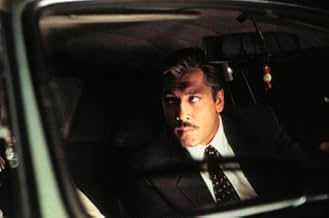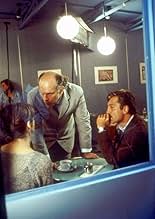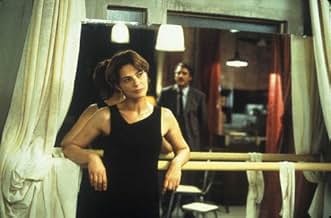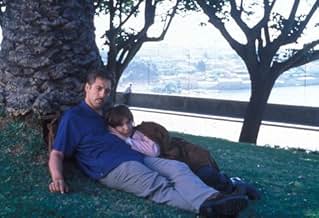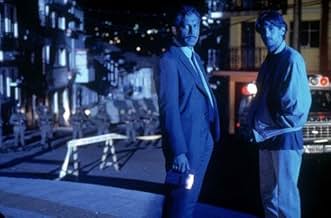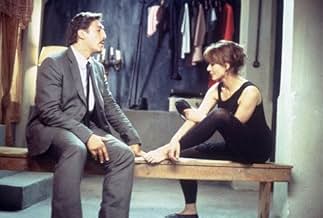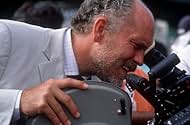IMDb-BEWERTUNG
6,9/10
7142
IHRE BEWERTUNG
Füge eine Handlung in deiner Sprache hinzuA police detective in a South American country is dedicated to hunting down a revolutionary guerilla leader.A police detective in a South American country is dedicated to hunting down a revolutionary guerilla leader.A police detective in a South American country is dedicated to hunting down a revolutionary guerilla leader.
- Auszeichnungen
- 1 Gewinn & 3 Nominierungen insgesamt
Empfohlene Bewertungen
'The Dancer Upstairs' marks John Malkovich's debut as a film director, but it's hardly his first time in the director's chair: Malkovich was a charter member of the now-prestigious Steppenwolf Theater Company in Chicago, where he split time between acting and directing, developing the versatility that has earned him regard as one of the best character actors in the business. He brings a stage director's consciousness to this fine, unexpectedly suspenseful and complex thriller, a fictionalized dramatization of events surrounding the rise and fall of the Shining Path revolutionary movement in Peru.
In the lead role of Detective Augustin Rejas is Javier Bardem, already an established star in his native Spain who is gaining increasingly wide notice in the US for his award-winning turns in Julian Schnabel's 'Before Night Falls' (2002) and Alejandro Amenabar's 'The Sea Inside' (2004). Bardem, like Malkovich, is a wonderfully versatile actor, and this film offers him another fine opportunity to display his range as Rejas, an idealistic police detective who abandoned a promising career as a trial lawyer in the hope that he might be able to work within the system to heal the corruption of his native country (left unnamed, though the story clearly borrows from actual events in Peru).
The film opens on the high plains at the foothills of the Andes, with Rejas working at a highway checkpoint station. He encounters a vehicle bearing a mysterious undocumented passenger. While Rejas follows procedure, his colleague accepts a bribe, and allows the vehicle to flee the scene.
Years later, Rejas has advanced through the ranks and now works as a detective in the nation's coastal capital. He and his partner Sucre (Juan Diego Botto, making the most of a small role) gradually begin to discover evidence of a burgeoning revolutionary movement led by the enigmatic 'Presidente Ezequiel,' whom Rejas eventually realizes to be the same man he met briefly years earlier at the mountain checkpoint. The followers of Ezequiel--a former college professor and Marxist who went underground ten years earlier to foment a 'fourth wave' of communist revolution (the first three being the USSR, China, and Cuba)--begin to terrorize the capital and outlying regions with suicide bombings and brutal assassinations. Rejas must uncover the secret of Ezequiel before the President enacts martial law and turns the government into another version of the brutal dictatorships previously seen in Bolivia, Chile, and Argentina.
As the Ezequiel mystery deepens, Rejas begins to develop an infatuation with his daughter's ballet instructor, Yolanda (Laura Morante), with who he shares an unspoken bond and who seems to be an attractive alternative to his own wife (Alexandre Lencastre), a sweet but superficial woman who obsesses over fashion magazines and makeup and begs her perpetually broke husband to let her get a nose job. Rejas begins to court Yolanda, and as he becomes more deeply involved with her, he begins to discover evidence that she may be knowingly or unknowingly connected in some way to Ezequiel.
The political dimension of the story is fascinating, but the main source of conflict is the interior world of Rejas, a sensitive, morally decent man who is torn between his faith in the law and his sympathy for the people who suffer at the hands of corrupt government officials. Rejas is also torn between his sense of honor and decency and his profound emotional attraction to Yolanda. It's a tough role to pull off, and Malkovich gives Bardem the time and opportunity to draw the character's emotional complexity with subtle, patient, expressive moments and line deliveries. Bardem has the rare ability to convey distinct emotions or states of thought with subtle gestures and nuanced facial expressions, and Malkovich demonstrates an actor's trust in another gifted actor to accomplish the film's emotional subtext.
There are a few problems here and there. Rejas' attraction to Yolanda is understandable, but their burgeoning relationship feels a bit forced and underdeveloped at times. A subplot involving the Chinese embassy is introduced but left more or less unresolved. The plot is vaguely predictable, though, in the film's defense, the suspense has more to do with how Rejas will deal with the revelations his investigation will uncover than with what will actually be revealed.
Even with the flaws, 'The Dancer Upstairs' is a highly intelligent and entertaining film, and offers yet another opportunity for American audiences to become acquainted with the fabulously talented Javier Bardem, who is my pick to be the next Marlon Brando.
In the lead role of Detective Augustin Rejas is Javier Bardem, already an established star in his native Spain who is gaining increasingly wide notice in the US for his award-winning turns in Julian Schnabel's 'Before Night Falls' (2002) and Alejandro Amenabar's 'The Sea Inside' (2004). Bardem, like Malkovich, is a wonderfully versatile actor, and this film offers him another fine opportunity to display his range as Rejas, an idealistic police detective who abandoned a promising career as a trial lawyer in the hope that he might be able to work within the system to heal the corruption of his native country (left unnamed, though the story clearly borrows from actual events in Peru).
The film opens on the high plains at the foothills of the Andes, with Rejas working at a highway checkpoint station. He encounters a vehicle bearing a mysterious undocumented passenger. While Rejas follows procedure, his colleague accepts a bribe, and allows the vehicle to flee the scene.
Years later, Rejas has advanced through the ranks and now works as a detective in the nation's coastal capital. He and his partner Sucre (Juan Diego Botto, making the most of a small role) gradually begin to discover evidence of a burgeoning revolutionary movement led by the enigmatic 'Presidente Ezequiel,' whom Rejas eventually realizes to be the same man he met briefly years earlier at the mountain checkpoint. The followers of Ezequiel--a former college professor and Marxist who went underground ten years earlier to foment a 'fourth wave' of communist revolution (the first three being the USSR, China, and Cuba)--begin to terrorize the capital and outlying regions with suicide bombings and brutal assassinations. Rejas must uncover the secret of Ezequiel before the President enacts martial law and turns the government into another version of the brutal dictatorships previously seen in Bolivia, Chile, and Argentina.
As the Ezequiel mystery deepens, Rejas begins to develop an infatuation with his daughter's ballet instructor, Yolanda (Laura Morante), with who he shares an unspoken bond and who seems to be an attractive alternative to his own wife (Alexandre Lencastre), a sweet but superficial woman who obsesses over fashion magazines and makeup and begs her perpetually broke husband to let her get a nose job. Rejas begins to court Yolanda, and as he becomes more deeply involved with her, he begins to discover evidence that she may be knowingly or unknowingly connected in some way to Ezequiel.
The political dimension of the story is fascinating, but the main source of conflict is the interior world of Rejas, a sensitive, morally decent man who is torn between his faith in the law and his sympathy for the people who suffer at the hands of corrupt government officials. Rejas is also torn between his sense of honor and decency and his profound emotional attraction to Yolanda. It's a tough role to pull off, and Malkovich gives Bardem the time and opportunity to draw the character's emotional complexity with subtle, patient, expressive moments and line deliveries. Bardem has the rare ability to convey distinct emotions or states of thought with subtle gestures and nuanced facial expressions, and Malkovich demonstrates an actor's trust in another gifted actor to accomplish the film's emotional subtext.
There are a few problems here and there. Rejas' attraction to Yolanda is understandable, but their burgeoning relationship feels a bit forced and underdeveloped at times. A subplot involving the Chinese embassy is introduced but left more or less unresolved. The plot is vaguely predictable, though, in the film's defense, the suspense has more to do with how Rejas will deal with the revelations his investigation will uncover than with what will actually be revealed.
Even with the flaws, 'The Dancer Upstairs' is a highly intelligent and entertaining film, and offers yet another opportunity for American audiences to become acquainted with the fabulously talented Javier Bardem, who is my pick to be the next Marlon Brando.
Actor John Malkovich makes an auspicious directorial debut with `The Dancer Upstairs,' an intriguing, if not altogether satisfying, police procedural set in an unnamed Latin American country.
Javier Bardem (`Night Must Fall') gives a richly textured performance as Detective Augustin Rejas, a man of principle and ethics operating in a world of corruption and violence. Rejas finds himself embroiled in a life-and-death mystery when he investigates an underground terrorist organization that is targeting key government officials for assassination. Who these people are is not at all clear to those in charge and even their motives can only be guessed at. As Rejas studies the clues in search of answers, he becomes drawn to a beautiful young dance teacher with whom he establishes a platonic yet highly charged romantic relationship. It is in the bringing together of these two seemingly disparate plot lines that the movie fails, ultimately, to satisfy. For roughly the first three quarters of the film, as Rejas collects his evidence and unravels the puzzle, we gladly go along where the filmmakers are taking us, fascinated by the setting, the atmosphere and the contemporary relevance of the terrorism theme. But when, towards the end, the story kicks into high tragedy mode, the movie loses us, partly because the plotting itself is not particularly credible and partly because the relationship between Rejas and the woman has not been sufficiently developed to achieve the status of genuine tragedy. The film is much better when it sticks to the business of the case and leaves all the existential navel-gazing out of the mix.
This is not to demean either the moving, beautifully modulated performance of Bardem or the stark, self-assured direction of Malkovich, who shows he knows how to function as well behind the camera as he does in front. True, the film is a trifle slow at times but this just shows that Malkovich will not be rushed when the material itself demands deliberation and care. Although the movie is about a half hour too long, real languor begins to set in only during the final stretches. Until then, `The Dancer Upstairs' makes for rewarding viewing.
Javier Bardem (`Night Must Fall') gives a richly textured performance as Detective Augustin Rejas, a man of principle and ethics operating in a world of corruption and violence. Rejas finds himself embroiled in a life-and-death mystery when he investigates an underground terrorist organization that is targeting key government officials for assassination. Who these people are is not at all clear to those in charge and even their motives can only be guessed at. As Rejas studies the clues in search of answers, he becomes drawn to a beautiful young dance teacher with whom he establishes a platonic yet highly charged romantic relationship. It is in the bringing together of these two seemingly disparate plot lines that the movie fails, ultimately, to satisfy. For roughly the first three quarters of the film, as Rejas collects his evidence and unravels the puzzle, we gladly go along where the filmmakers are taking us, fascinated by the setting, the atmosphere and the contemporary relevance of the terrorism theme. But when, towards the end, the story kicks into high tragedy mode, the movie loses us, partly because the plotting itself is not particularly credible and partly because the relationship between Rejas and the woman has not been sufficiently developed to achieve the status of genuine tragedy. The film is much better when it sticks to the business of the case and leaves all the existential navel-gazing out of the mix.
This is not to demean either the moving, beautifully modulated performance of Bardem or the stark, self-assured direction of Malkovich, who shows he knows how to function as well behind the camera as he does in front. True, the film is a trifle slow at times but this just shows that Malkovich will not be rushed when the material itself demands deliberation and care. Although the movie is about a half hour too long, real languor begins to set in only during the final stretches. Until then, `The Dancer Upstairs' makes for rewarding viewing.
Very closely based on Guzman and the Shining Path Maoist terrorists in Peru, this movie is compulsive viewing.
The plot is fairly standard good cop tracks down bad guys - there are no bonus points for this plot. Indeed, some of the coincidences that arise as the film goes on are the weakest link in this otherwise near-flawless movie.
There has been much talk about the violent scenes in this movie, which are many, but especially the scenes with animals. My view is that it is no more morally wrong to depict violence to animals than it is to depict violence to humans, as long as no animal (or human) is actually harmed in making the depiction. We are told that none of the animals were harmed in the making of the film (and presumably also none of the people). As far as I am concerned that is the end of that matter - the use of animals, unhamred, for this purpose is acceptable. To argue otherwise I find, frankly, daft. However, I would recommend that people who get particularly upset when violence to animals is depicted should simply avoid this movie.
Back to the movie - the acting and the cinematography are superb. It is gripping - the film is 135 minutes long which is well past my attention span unless the film is really good. This film is just that.
The plot is fairly standard good cop tracks down bad guys - there are no bonus points for this plot. Indeed, some of the coincidences that arise as the film goes on are the weakest link in this otherwise near-flawless movie.
There has been much talk about the violent scenes in this movie, which are many, but especially the scenes with animals. My view is that it is no more morally wrong to depict violence to animals than it is to depict violence to humans, as long as no animal (or human) is actually harmed in making the depiction. We are told that none of the animals were harmed in the making of the film (and presumably also none of the people). As far as I am concerned that is the end of that matter - the use of animals, unhamred, for this purpose is acceptable. To argue otherwise I find, frankly, daft. However, I would recommend that people who get particularly upset when violence to animals is depicted should simply avoid this movie.
Back to the movie - the acting and the cinematography are superb. It is gripping - the film is 135 minutes long which is well past my attention span unless the film is really good. This film is just that.
Having seen "Being John Malkovich" recently, I expected a lot from "The Dancer Upstairs" and I have to admit that I really was enchanted by it. Even though it never says which country in South America this story is based on, it's clear that it must be Peru. There just are too many references to the rebel movement The Shining Path, president Fujimori... But it's good that it never says that it is actually Peru. There are more South American dictatorships, more rebel movements...
It tells the story of an ex-lawyer who has become police officer, because he wanted justice to be done in the right way. He has to hunt down and arrest a revolutionary guerilla leader, but as he digs deeper, he'll find out that more people are actually supporting the rebels than he thought, even the people that he never suspected...
What I liked so much about the movie is the way it portrays everything. It doesn't fear to show the violence committed by both sides, but also shows the beautiful side of the country (its landscapes, its culture,...). Some say this is clearly a right-wing movie and that Malkovich is right wing as well. What has the political preference of the director to do with it? This movie isn't right-wing, nor is it left-wing. It clearly shows both sides, giving you the police detective who works for the right-wing government, who falls in love with the left-wing activist.
If there is one remark that I have to make, than it must be the fact that the actors didn't speak in Spanish. Now they had some weird Spanish-English accent. But all the rest was really very good. I give it an 8.5/10.
It tells the story of an ex-lawyer who has become police officer, because he wanted justice to be done in the right way. He has to hunt down and arrest a revolutionary guerilla leader, but as he digs deeper, he'll find out that more people are actually supporting the rebels than he thought, even the people that he never suspected...
What I liked so much about the movie is the way it portrays everything. It doesn't fear to show the violence committed by both sides, but also shows the beautiful side of the country (its landscapes, its culture,...). Some say this is clearly a right-wing movie and that Malkovich is right wing as well. What has the political preference of the director to do with it? This movie isn't right-wing, nor is it left-wing. It clearly shows both sides, giving you the police detective who works for the right-wing government, who falls in love with the left-wing activist.
If there is one remark that I have to make, than it must be the fact that the actors didn't speak in Spanish. Now they had some weird Spanish-English accent. But all the rest was really very good. I give it an 8.5/10.
I would expect a movie directed by John Malkovich to be intense and specific. The Dancer Upstairs is that. It is a political movie that while popular in Europe, does not tend to draw well in the United States. Too bad.
The story tells the tale of a lawyer who has left the law looking for a better system. I don't know that becoming a police detective is that much better, but it serves the story. The story is set in a nameless Latin American country -- which also suits the story line.
Detective Lt. Agustín Rejas (Javier Bardem) has left a law firm where he was a junior partner, to join law enforcement -- with a conscious. He can give a break to a traveler whose papers are not quite right and he can be relentless in his pursuit of a terrorist.
Rejas has been victimized by the politics of his country. His father lost his coffee farm to the soldiers. His view of the judicial system has seen a rapist become president of the country. But still, Rejas finds joy in his beautiful dancer daughter and his wife -- who has a political mission of her own. Then he meets the free spirited dance instructor for his daughter.
Rejas works in a corrupt society where the fiscal corruption goes hand in hand with the moral and political corruption. The central government is all too ready to suspend civil rights and to put military law into effect. The military killing innocent people is fine as long as it suits the party.
Rejas attempts to live the just life and must deal with the corruption the best he can. This conflict is the heart of the movie. As he says, he has feelings about his father losing his farm and he is the Gary Cooper type.
Javier Bardem is excellent in the pivotal role. Juan Diego Botto does a very credible job as Detective Sgt. Sucre. Laura Morante is intoxicating as dance instructor focal point of the story.
I give this move a 9 for great story and suspense, excellent direction and fine acting. There is no sex and very brief nudity. The violence does tend to be horrific and there are depictions of cruelty to animals -- both central to the plot. This is far less than the typical Jason or Chainsaw movies gore.
I consider this an excellent direction debut for John Malkovich and look forward to his next feature film effort. It feels like Malkovich will fill a role similar to Robert Redford in films he has directed.
The story tells the tale of a lawyer who has left the law looking for a better system. I don't know that becoming a police detective is that much better, but it serves the story. The story is set in a nameless Latin American country -- which also suits the story line.
Detective Lt. Agustín Rejas (Javier Bardem) has left a law firm where he was a junior partner, to join law enforcement -- with a conscious. He can give a break to a traveler whose papers are not quite right and he can be relentless in his pursuit of a terrorist.
Rejas has been victimized by the politics of his country. His father lost his coffee farm to the soldiers. His view of the judicial system has seen a rapist become president of the country. But still, Rejas finds joy in his beautiful dancer daughter and his wife -- who has a political mission of her own. Then he meets the free spirited dance instructor for his daughter.
Rejas works in a corrupt society where the fiscal corruption goes hand in hand with the moral and political corruption. The central government is all too ready to suspend civil rights and to put military law into effect. The military killing innocent people is fine as long as it suits the party.
Rejas attempts to live the just life and must deal with the corruption the best he can. This conflict is the heart of the movie. As he says, he has feelings about his father losing his farm and he is the Gary Cooper type.
Javier Bardem is excellent in the pivotal role. Juan Diego Botto does a very credible job as Detective Sgt. Sucre. Laura Morante is intoxicating as dance instructor focal point of the story.
I give this move a 9 for great story and suspense, excellent direction and fine acting. There is no sex and very brief nudity. The violence does tend to be horrific and there are depictions of cruelty to animals -- both central to the plot. This is far less than the typical Jason or Chainsaw movies gore.
I consider this an excellent direction debut for John Malkovich and look forward to his next feature film effort. It feels like Malkovich will fill a role similar to Robert Redford in films he has directed.
Wusstest du schon
- WissenswertesThe story is inspired by the Maoist insurgency in Peru known as the Shining Path. Its leader Abimael Guzmán, who was known by the nom de guerre President Gonzalo, was captured in an apartment above a ballet studio in the capital city of Lima in 1992. The ballet teacher Yolanda was based on Maritza Garrido Lecca, the woman in whose apartment Guzmán was found. Bardem's character was inspired by Benedicto Jimenez and Gen. Antonio Ketin Vidal, the leading figures responsible for Guzmán's capture.
- PatzerWhen Sucre & Llosa arrest the young woman in orange, she has been handcuffed to the ceiling of the car. But then en route, soldiers simply drag her out of the backseat. No handcuff keys. No bolt cutters.
- Zitate
Agustín Rejas: I'd like to have a list of staff with access to the President's chambers.
Calderón: Luckily there are only two of them. The first is named 'Fuck', the second is named 'Off'.
- Crazy CreditsThe producers would like to thank ... the residents of Narcisos Street ...
- VerbindungenFeatured in Revealing 'The Dancer Upstairs' (2003)
- SoundtracksViagens Interditas
(1995)
Written by Pedro Malgheas (as Pedro Ayres) and Rodrigo Leão
Performed by Madredeus
Licensed by Dpte. de Productos Especiales de
(p) EMI Odean, S.A., Madrid, Spain, 2001 exclusive rights holder
Top-Auswahl
Melde dich zum Bewerten an und greife auf die Watchlist für personalisierte Empfehlungen zu.
- How long is The Dancer Upstairs?Powered by Alexa
Details
Box Office
- Bruttoertrag in den USA und Kanada
- 2.377.348 $
- Eröffnungswochenende in den USA und in Kanada
- 106.142 $
- 4. Mai 2003
- Weltweiter Bruttoertrag
- 5.227.348 $
- Laufzeit
- 2 Std. 12 Min.(132 min)
- Farbe
- Sound-Mix
- Seitenverhältnis
- 1.85 : 1
Zu dieser Seite beitragen
Bearbeitung vorschlagen oder fehlenden Inhalt hinzufügen



